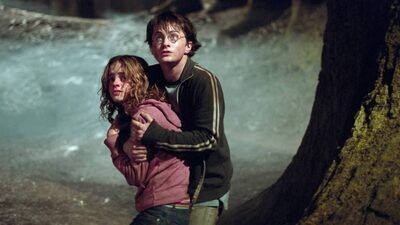Returning for Harry, Ron, and Hermione’s third year at Hogwarts, Cuaron’s first order of business is destroying any pre-established conventions of Hogwarts as a safe haven. Where Chris Columbus had painted the castle as a warm, whimsical escape from the cruelties of Harry’s muggle life, Cuaron transforms it into something cold and remote. Suddenly, Hogwarts’ grandiose, gothic architecture is something out of a horror story rather than a fairytale.
Even the Quidditch field, the site of Harry’s first Hogwarts triumph, is no longer safe, with dementors lurking behind thunderclouds, ready to send Harry plummeting off his broom. From the Hogwarts Choir’s repeated refrain of “something wicked this way comes” to the silent screaming wanted posters plastered all over the walls of the Leaky Cauldron, Cuaron spends the first hour of “Prisoner of Azkaban” transforming the Wizarding World into a cold, haunting, paranoia-ridden nightmare, haunted by the ever-present threat of Sirius Black.
But for the boy who lived, a serial killer escaping prison to hunt him down is nothing new — he’s been defying death since he was an infant. Where the wizarding world sees Sirius Black as a danger, Harry sees an opportunity— a rare chance to learn more about his past and a tangible, living, breathing connection to his parents. His misadventures with the Marauder’s Map (as whimsical and iconic as they are in their own right) are motivated by a desperate, self-destructive search for answers about his own identity.

As Harry continues barreling towards the truth, Rowling and Cuaron peel back the layers on their polite, soft-spoken protagonist, showing the first glimmers of the raw, steely core at the heart of the character. The sorting hat knew Harry was a Gryffindor, but “Prisoner of Azkaban” gives us our first taste of a bolder, brasher, more reckless Harry — one eerily reminiscent of his father.
Radcliffe’s wholehearted performance continues to be the lifeblood of the series, but under Cuaron’s direction, 13-year-old Daniel Radcliffe finds a new scrappiness and ferocity to combat the imposing, oppressive gloom of his ever-darkening world. By the time Harry reaches the shrieking shack, he’s tired, angry, and at the end of his fuse — expecting to be let down (yet again) by the adults in his life when Professor Lupin (David Thewlis) appears in the Shrieking Shack at the eleventh hour, seemingly aligned with the murderous Sirius Black.

